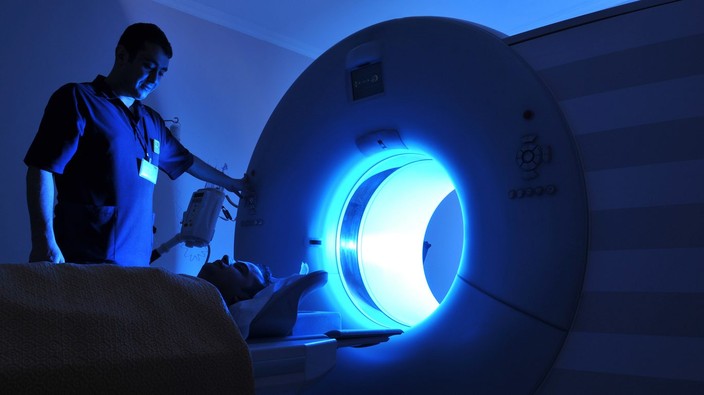mris reveal ‘significant abnormalities’ in the brains of covid survivors
mris found changes in the frontal lobe and brain stem even six months after patients recovered from covid.

portions of the left frontal lobe are responsible for, among other things, language production and comprehension. getty
a new study has found that patients who have recovered from covid-19 still have changes in their brains up to six months later.
the research, which will be presented next week at the annual meeting of the radiological society of north america, relied on a special type of mri that uses susceptibility-weighted imaging to analyze the effects covid-19 has on the brain. magnetic susceptibility determines how much certain materials in the body, such as blood, iron and calcium, become magnetized in an applied magnetic field. this information helps detect and monitor a number of neurological conditions, including brain tumours, stroke, microbleeds and vascular malformations.
“group-level studies have not previously focused on covid-19 changes in magnetic susceptibility of the brain despite several case reports signaling such abnormalities,” said sapna s. mishra, co-author of the study and ph.d. candidate at the indian institute of technology in delhi. “our study highlights this new aspect of the neurological effects of covid-19 and reports significant abnormalities in covid survivors.”
a recent report by statistics canada found that just under 15 per cent of canadians who contracted covid-19 between april 1 and august 15 of this year were still experiencing symptoms at least three months after being infected. this lines up with data from the u.s. centers for disease control and prevention that found around one in five adults can expect to experience lingering symptoms from their encounter with the virus. neurological symptoms of long covid currently include difficulty thinking or sleeping, lightheadedness, headaches, changes to smell or taste, depression and anxiety.
advertisement
previous research, however, has suggested that the virus may also be associated with changes to the heart, lungs or other organs — even in patients who have not experienced any symptoms of covid-19.
to get a better look beneath the surface, researchers looked at the susceptibility-weighted imaging data from 46 people who recovered from covid and 30 healthy control subjects. mris were performed within six months of recovery from covid on patients who most commonly reported lingering symptoms of fatigue, difficulty sleeping, lack of attention and memory issues.
“changes in susceptibility values of brain regions may be indicative of local compositional changes,” mishra said. “susceptibilities may reflect the presence of abnormal quantities of paramagnetic compounds, whereas lower susceptibility could be caused by abnormalities like calcification or lack of paramagnetic molecules containing iron.”
the mris revealed that, compared to the healthy control group, people who recovered from covid-19 had significantly higher susceptibility values in the frontal lobe and brain stem. in the frontal lobes, these differences were largely seen in the white matter. “these brain regions are linked with fatigue, insomnia, anxiety, depression, headaches and cognitive problems,” mishra said.
advertisement
portions of the left frontal lobe are responsible for, among other things, language production and comprehension. portions of the right frontal lobe are associated with cognitive functions, including attention, motor inhibition and imagery.
the mris also revealed a significant difference between groups in the right ventral diencephalon area of the brainstem, a region associated with numerous important functions, including coordination with the endocrine system for hormone release, relaying motor and sensory information to the cerebral cortex and regulating the sleep-wake cycle.
the researchers are now conducting a longitudinal study on the same patient cohort to determine how long the brain anomalies they have discovered can be expected to last.
“this study points to serious long-term complications that may be caused by the coronavirus, even months after recovery from the infection,” mishra said. “the present findings are from the small temporal window, however, the longitudinal time points across a couple of years will elucidate if there exists any permanent change.”
dave yasvinski is a writer with healthing.ca
advertisement
thank you for your support. if you liked this story, please send it to a friend. every share counts.
 3 minute read
3 minute read





